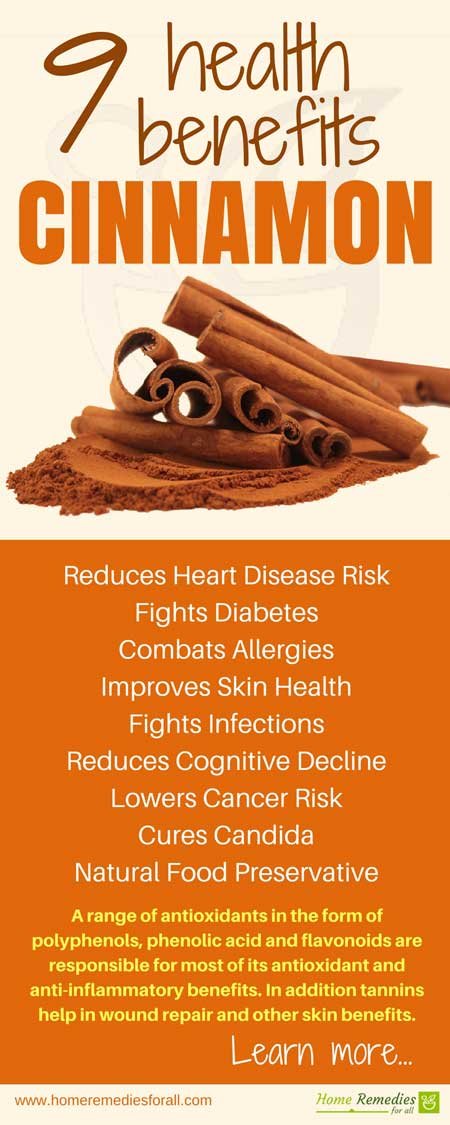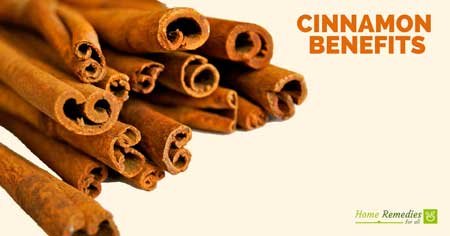Cinnamon is one of the most loved spices around the globe. Its aroma and tastes are irresistible for most people. Cinnamon is one of the few spices that comes from the bark of a tree. Most other spices are from roots, flowers, leaves and seeds. With a large variety of polyphenols and phenolic compounds, it has one of the highest antioxidant and anti-inflammatory properties among the spices.
As more research is done health benefits of cinnamon are being scientifically recognised, although it has been used for medicinal purposes for thousands of years. A lot more research is still required to assess its full list of benefits.
Table of Contents
What is Cinnamon and Its Nutrients?
The popular spice cinnamon actually comes from the inner bark of a tree calledcinnamon verum(Ceylon cinnamon). Another variety comes from cinnamon aromaticum (Chinese cinnamon or Cassia cinnamon). There are many other varieties coming from the same species genus Cinnamomum.
Cinnamon is one of the top most popular spices used mainly as an aromatic condiment and flavoring additive in a wide variety of cuisines, breakfast cereals, and traditional foods.
Cinnamon as bark, powder and oil forms is used both in culinary and medicinal purposes.
NUTRITION FACTS
Amount Per 100 grams
- Calories 247
- Total Fat 1.2 g 1% DV
- Potassium 431 mg 12% DV
- Total Carbohydrate 81 g 27% DV
- Dietary fiber 53 g 211% DV
- Suga 2.2 G
- Protein 4 g 8% DV
- Vitamin A 5% DV
- Vitamin C 6% DV
- Vitamin B-6 10% DV
- Calcium 100% DV
- Iron 46% DV
- Magnesium 15% DV
*Percent Daily Values are based on a 2,000 calorie diet. Your daily values may be higher or lower depending on your calorie needs. Source: USDA.
A range of antioxidants in the form of polyphenols, phenolic acid and flavonoids are responsible for most of its antioxidant and anti-inflammatory benefits. In addition tannins help in wound repair and other skin benefits.
Health Benefits of Cinnamon
Let us look at the full range of health benefits of cinnamon in details.

Reduces Heart Disease Risks
Cinnamon helps the heart in more than one way.
- Reduces total cholesterol
- Lowers LDL
- Lowers triglycerides
- Maintains HDL
In some studies cinnamon has even shown increased HDL levels in the cholesterol.
When cinnamon reduces bad cholesterol LDL, increases good cholesterol HDL and even lowers your blood pressure, then your major risk factors for heart disease are in check.
Cinnamon benefits the heart and is not just limited the above. It actually also improves blood circulation and prevents blood clots.
So add a pinch of cinnamon in your daily diet to keep your heart healthy.
Fights Diabetes
Cinnamon reduces insulin resistance which is one of the main contributors to diabetes type 2.
People with insulin resistance can not transport sugar from the bloodstream to the cells. This causes metabolic disorders and type 2 diabetes.
Studies have shown that cinnamon helps to reduce insulin resistance. It blocks enzymes called alanines to reduce sugar absorption by the blood. Sugar then gets transported to the cells where it gets absorbed in normal way. Thus improving diabetes and lower blood sugar levels. Cinnamon is one of the best remedies for diabetes type 2.
Combats Allergies
The antioxidants and anti-inflammatory compounds in cinnamon can combat histamine reactions which are main causes of allergic reactions.
According to a study cinnamon taken in essential oil form helps to deal with inflammatory diseases due to many bioactive compounds.
More human studies are required to establish the antihistamine benefits of cinnamon.
Improves Skin Health
Cinnamon benefits your skin in many different ways. It does the following to your skin due to its antimicrobial and anti-inflammatory capabilities.
- Protects from irritation and rashes
- Prevents allergic reactions
- Treats infections
- Reduces swelling, pain and redness
You can apply cinnamon extract on your skin. Add honey to increase the effects as honey is also antimicrobial. It will benefit in dealing with acne, rosacea and skin allergies.
Fights Infections
Cinnamon is not only anti-inflammatory but is also antibacterial and antifungal.
Various compounds in cinnamon display these characteristics and one such active compound called cinnamaldehyde is capable of fighting many kinds of infections.
So, from the fungi in the respiratory tract to salmonella in the digestive tract and many other fungi and bacteria in the mouth, cinnamon can protect you from many infections.
It is therefore a very good home remedy for bad breath as it kills bacteria in the mouth and the respiratory tract.
Reduces Cognitive Decline
Oxidative stresses have degenerative impact in the entire body. As you age these oxidative stresses begin cognitive decline. Your brain functioning is affected and you can develop neurological diseases such as Alzheimer's and Parkinson's.
The large number of polyphenols and other antioxidants in cinnamon combat the free radicals and protect your body and brain from the oxidative stresses caused by the free radicals. The anti-inflammatory compounds of cinnamon also help in this aspect.
Your brain functions sharper and is less affected by the aging process.
Lowers Cancer Risk
Cancer is a dreadful condition and a lot of research is being done to treat it and prevent it.
The lab and animal studies done on cinnamon suggests that cinnamon is toxic to cancer cells. There is not enough human study data available as yet, but these test tube research is promising.
The antioxidants in cinnamon are responsible for stopping the progression of cancer cells.
Cancer can be prevented or treated by preventing cancer cells from multiplying. There is no breakthrough yet in finding a compound that can completely destroy cancer cells without destroying normal cells. So any development that prevents cancer cell growth is a good step forward in dealing with cancer. Cinnamon extract has been found to be useful in doing that particularly in the cancer if colon.
Cures Candida
The two properties of cinnamon helps to prevent and treat the overgrowth of candida
One is it's antifungal capabilities that stops the overgrowth of candida in the digestive tract and the other is it's capabilities to control blood sugar levels.
In fact high blood sugar levels are one of the biggest struggle hurdles in treating candida overgrowth. Candida albicans is the yeast that causes the overgrowth of candida in the digestive tract and it thrives on sugar.
Once the sugar supply is reduced it cuts off and the antifungal compounds of cinnamon begin to act, candida growth stops and normalcy of bacteria in the intestine is restored.
If you want to avoid chemical and artificial preservatives then consider cinnamon as your natural help.
Studies have shown that cinnamon leaf extract due to its antioxidant and antibacterial capabilities is able to keep fruits stay fresh longer.
The fruits and vegetables don't get oxidized and become discolored due to the cinnamon leaf extract.
Precautions and Tips
Cinnamon bark is generally safe for most people if taken in medicinal quantities. Cinnamon used in food is much lower in quantity so it's very safe. However too much of it is unsafe and can cause following complications:
- Irritate skin and mucous membranes
- Cause diarrhea, vomiting and dizziness
- Reduce blood sugar levels too much in people taking diabetic medicines
- Drop blood pressure to low in people with low blood pressure
The Impact of cinnamon on pregnant and breastfeeding women is not studied extensively, so it is better to stay within the limits of consuming cinnamon in food amounts.
Cassia cinnamon from.china contains coumarin which can cause liver damage if consumed in large quantities.

